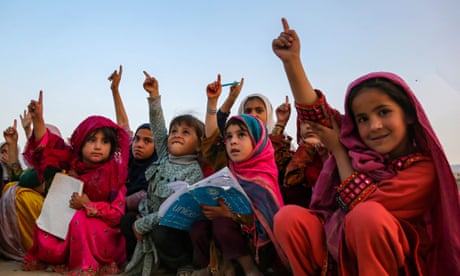The Taliban is causing “irreversible damage” to Afghanistan’s education system through the reintroduction of corporal punishment, curriculum changes and the use of unqualified teachers to replace women, most of whom have been barred from schools, Human Rights Watch has warned.
After taking power in 2021, the Taliban banned girls from secondary schools. A new report from Human Rights Watch (HRW), published on Wednesday, warns that boys’ education has also suffered under the Taliban, although this has gone largely unreported.
HRW said the ban on female teachers had left a gap that had been filled by unqualified men and had reduced the range of subjects being taught.
Sahar Fetrat, assistant women’s rights researcher at HRW, said: “The Taliban are causing irreversible damage to the Afghan education system for boys as well as girls. By harming the whole school system in the country, they risk creating a lost generation deprived of a quality education.”

The report said subjects such as the arts, sports and civics had been removed from the curriculum in many schools.
A document obtained by HRW, which it could not verify, proposed some of the changes that had occurred in schools. The document described the previous Afghan curriculum as using “un-Islamic and non-Afghan standards that resemble western standards”.
It complained that the curriculum encouraged western values and dress, promoted democracy, covered other faiths and taught pupils about non-Muslim writers, including Shakespeare.
HRW said there had been an increase in corporal punishment in schools since the Taliban took power. Boys are beaten and slapped, and have their feet whipped for having a mobile phone or not complying with new rigid rules on haircuts or clothing, which must be traditionally Afghan.
Zaman A, a pupil from Herat province quoted in the HRW report, said: “The Taliban’s strict rules are suffocating. Currently, as a student, wearing anything colourful is treated like a sin.
“Wearing shirts or T-shirts, ties or suits are all treated like crimes,” he said. “Every day, there are several cases where boys get punished during morning assembly or in classrooms for some of these reasons.”
HRW also said boys were coming under increasing pressure to work instead of going to school as Afghanistan grapples with drought, conflict and a crippling economic crisis. More than 28 million Afghans are in need of urgent assistance, with 6 million people at emergency levels of food insecurity – one step away from famine.
The rights group said boys were struggling with anxiety and depression because of the pressure to support their families.
While progress was made in education under the previous Afghan government, the Taliban swiftly banned girls from school after taking power in 2021. Last year it banned women from higher education, including from medical degrees, which will affect the future number of female healthcare workers.
Last week a report by ACAPS, a non-profit organisation that supports aid workers with analysis of humanitarian situations, reported that the Taliban’s promises to ease curbs on women and lift restrictions on access to education had been merely symbolic, used in negotiations with international partners but in effect unimplemented.
Fetrat said: “The Taliban’s impact on the education system is harming children today and will haunt Afghanistan’s future. An immediate and effective international response is desperately needed to address Afghanistan’s education crisis.”
 Afghanistan Peace Campaign
Afghanistan Peace Campaign